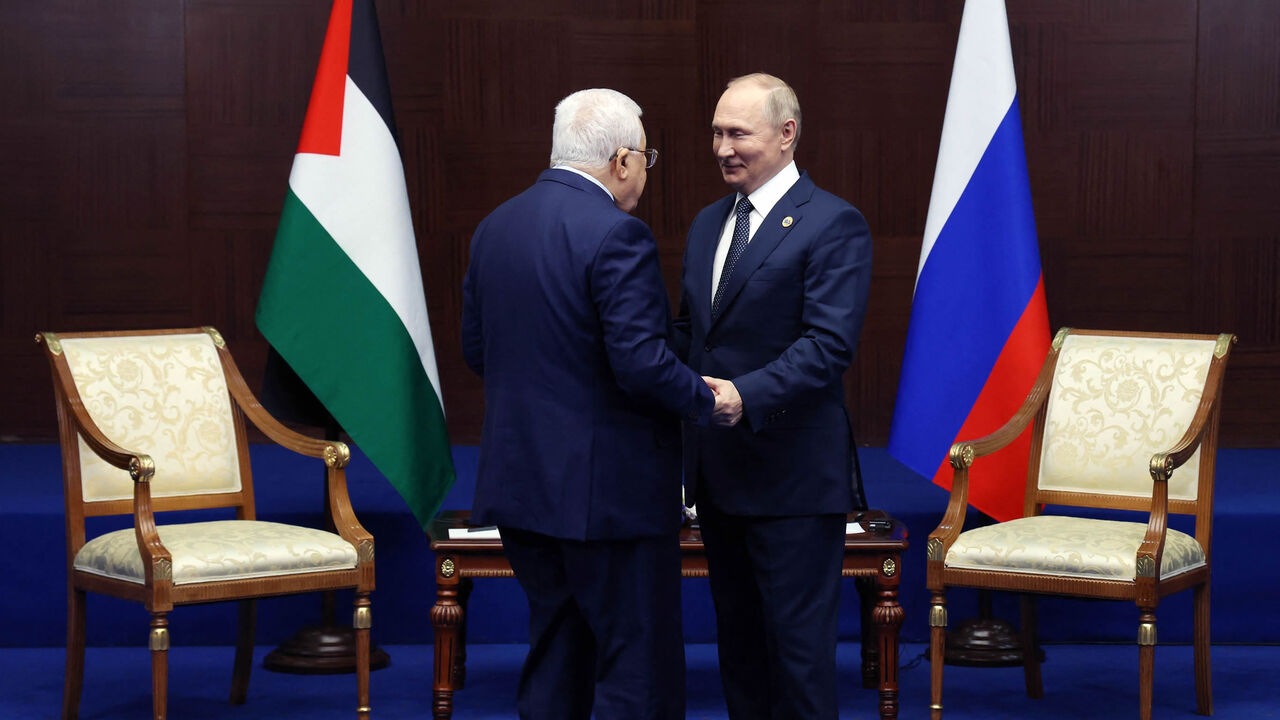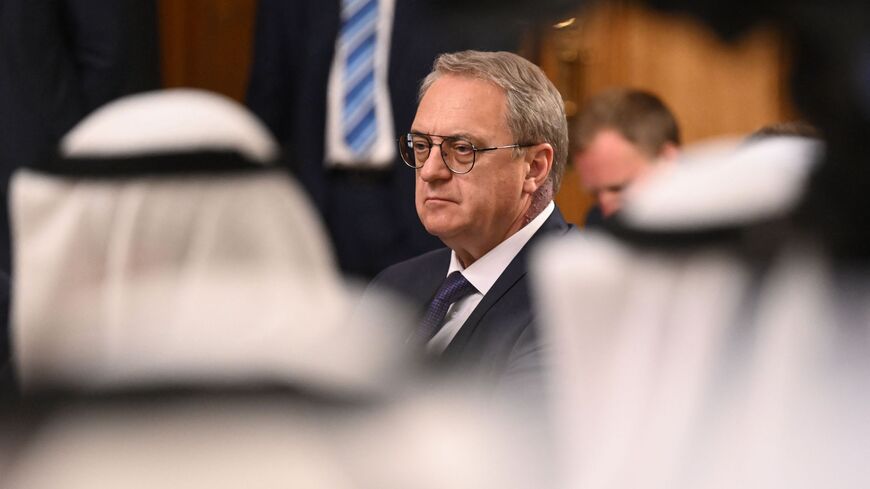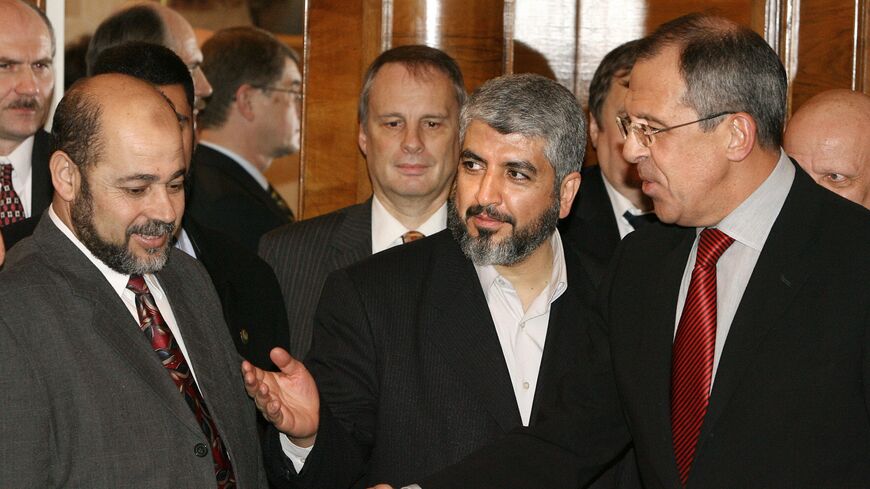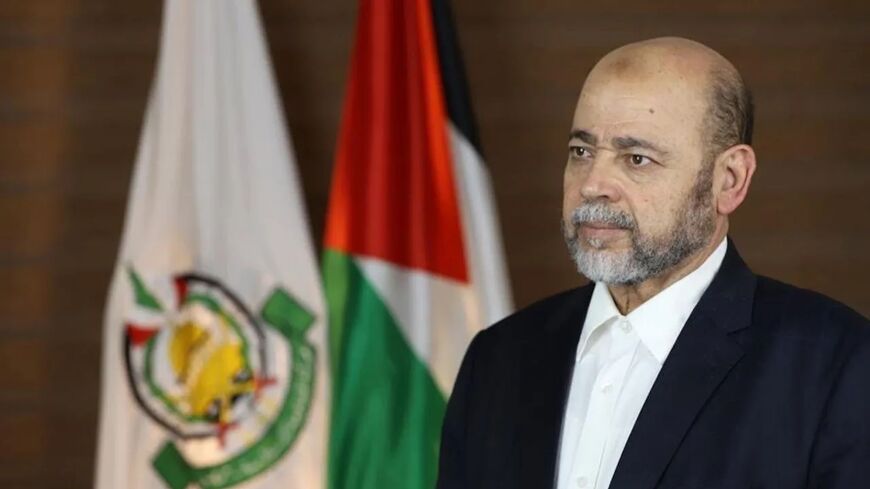Putin hosts Abbas as Russia looks for role in ending Gaza war
Russia’s President Vladimir Putin and Palestinian Authority President Mahmoud Abbas held talks in Moscow on first such visit for the Palestinian leader since 2021.

Russia’s President Vladimir Putin hosted his Palestinian counterpart, Mahmoud Abbas, in Moscow for talks on the war in Gaza and the latest developments in the Middle East.
In his opening remarks at the start of the meeting, Putin expressed his country’s concerns for the humanitarian crisis that is unfolding in the Gaza Strip and the loss of civilian lives.
He stressed Russia’s continuous support for Gaza and for a peaceful resolution of the Israeli-Palestinian conflict, according to the Russian state-owned RIA news agency.
“The Russian position has been formulated for a long time and in order to ensure a long-term, reliable and stable peace in the Middle East, it is necessary to implement all UN decisions and, first of all, to create a full-fledged Palestinian state,” Putin continued.
For his part, Abbas praised Russia’s efforts to achieve Palestinian reconciliation and called Putin 'a friend of the Palestinian people."
“We are happy to meet President Putin as a friend of the Palestinian people in order to exchange views regarding the difficult conditions that Palestine is experiencing, and to discuss ways to stop the aggression and war of extermination waged by the occupation in Gaza and the West Bank, including Jerusalem, and to avoid expanding the war in the region,” Abbas said, as reported by the official Palestinian WAFA news agency.
Abbas also reiterated his call for an immediate cease-fire and the full Israeli withdrawal from the Gaza Strip, to pave the way for the establishment of an independent Palestinian state with east Jerusalem as its capital.
The Palestinian leader arrived in Moscow late on Monday for a three-day visit, upon an invitation from Putin. Abbas last visited Russia in November 2021, during which he met with Putin in Sochi. The two leaders met again in October 2022 during the Conference on Interaction and Confidence-Building Measures in Asia held in Astana, Kazakhstan.
ِAccording to Russia's official news agency Tass, Putin held three phone conversations with Abbas since the war in the Gaza Strip erupted last October.
Israel launched its offensive on Gaza Oct. 7, in response to Hamas’ unprecedented cross-border attack during which militants of the Palestinian group killed nearly 1,200 people and took over 240 others hostage.
In Gaza, nearly 40,000 people, mostly women and children, have been killed in the offensive, according to figures from the Health Ministry in the enclave, while up to 1.9 million of the population was forced into displacement amid dire humanitarian conditions, the United Nations estimates.
Russia, which attempted to maintain balanced relations between the Palestinian side and Israel, has repeatedly called for a Gaza cease-fire and the release of the hostages, while condemning Hamas’ Oct. 7 attack.
Back in February, Putin had revealed that his country was working to secure the release of those who were taken captive by Hamas.
Meanwhile, Russia has hosted Palestinian factions on several occasions since last October as part of its efforts to achieve internal Palestinian reconciliation. Most recently in March, delegations from Fatah, which Abbas also heads, Hamas and Islamic Jihad met in Moscow for talks aimed at ending the Palestinian division.
On Oct. 26, a senior Hamas delegation headed by the group’s international relations chief Mousa Abu Marzouk traveled to Moscow where it met with Russia’s Deputy Foreign Minister Mikhail Bogdanov.
Again in March, Hamas dispatched a high-level delegation to the Russian capital for talks with Foreign Minister Sergey Lavrov.
Abbas’ visit to Russia this week comes amid mounting tensions in the region ahead of an expected Iranian response to the assassination of Hamas leader Ismail Haniyeh in Tehran late last month.
The Kremlin strongly condemned Haniyeh’s killing — which Iran and Hamas have accused Israel of carrying — warning of the “dangerous consequences” of such a move that could further destabilize the region.







